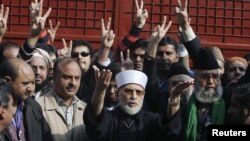Cellphone services were shut off, shops closed their doors, metal containers barricaded major roads, and riot police were at the ready as protestors entered the country's capital city.
Some 30,000 people were said to have arrived in Islamabad from the eastern city of Lahore in a two-day convoy. Another estimated 40,000 were expected to arrive overnight.
Protest organizers had predicted the numbers would reach in the hundreds of thousands.
Rally leader Tahir-ul Qadri is calling for the current government to step down as part of an overhaul of the country's electoral system. National voting for a new government is expected to be held in a few months.
Analysts say Qadri is tapping into the people's deep frustration with ongoing violence and a deteriorating economy, but his campaign is unlikely to have a significant impact on the political system.
But supporters like Mariam Khalid, who flew in from her home in Britain to join the protest, says Qadri stands for the kind of change the country needs.
"Basically this is about change, and I know that is kind of vague and everyone wants change. The difference with this protest is that it's not just about talking the talk, it's about walking the walk as well. What Dr. Tahir-ul Qadri is saying is basically that the people are sick of it, the situation in Pakistan; there is no food, no electricity, people are dying -- basically they are, that's the reality," Khalid said.
Relatively unknown until he returned to Pakistan a few weeks ago, Qadri has spent the last seven years in Canada leading an Islamic charity group with branches around the world.
Now his television ads are on all of Pakistan's major stations to protest what he says is a broken and corrupt political system that any election will just perpetuate.
If the national polls are held as scheduled, it will be the first time since Pakistan was formed in 1947 that a civilian government has completed its five-year term and peacefully handed over power to a new civilian leadership.
Tariq Junaid, head of Pakistan's Institute for Public Opinion Research, says Qadri's slogans are attractive, but his ability to force a change in the electoral laws, or even delay the elections, depends largely on the pressure Qadri can bring to bear on the government.
"Right now we have to see how much weightage the political parties will give to this. Apparently it seems like that, they are not taking it very seriously, they are letting it happen, and they think that in the due course of time it will die down, within the course of the next five or six days," Junaid said.
Junaid says as yet, there is a general consensus within Pakistani civil society that timely elections are the best way to remove corrupt politicians and give the country a fresh start.






